 Your new post is loading...
 Your new post is loading...
If you’ve seen any of CMI’s 2017 Benchmarks, Budgets, and Trends research, you may have noticed that the content marketing industry is growing up. In fact, 28% of B2B marketers, and 30% of B2C marketers now say their program has reached the sophisticated or mature stage of progress – the point where their efforts are able to provide measurable value to the business. Increasing sophistication with content doesn’t mean practitioners have outgrown the tools and techniques that helped them reach greater success. And, despite all the channels, formats, and digital innovations emerging in our industry over the last few years, one tried-and-true tactic, in particular, continues to lead the pack when it comes to reliably driving returns on the content investment: blogging....
Internet marketing consultants and strategists like myself have always provided a rather vague and stock answers like, "the more the better" which, by itself, is not very helpful. Now, however, thanks to some timely research and findings from Hubspot, we can provide business owners with a much more complete and helpful answer.
While it is certainly true that the more you blog, the better your results will be, it sure would be nice to know some more specifics, wouldn't it? How much more? How many blog posts per week? How many blog posts should I have on my site, in total, before I can expect to see larger gains? HubSpot recently surveyed over 7000 businesses and corporations who are actively blogging and using social media.
Online content marketing is the most powerful form of marketing for companies today. But what happens when it starts to feel stale, old, and boring? Like any other form of marketing, it happens.
Here are six ideas that can help you invigorate your existing efforts and get more mileage from them, without having to reinvent the wheel....
Not sure how to tell if your business blog is successful? Tracking these 15 blogging KPIs will do the trick.Anyone who manages a business blog knows all too well that the darn things require quite a bit of commitment.The bright side is, they can also be extremely rewarding from a return-on-investment perspective. But how do you know if all that commitment is actually leading to a positive ROI? Analytics, my friends. Analytics. As someone who pulls together the monthly report for this very blog, I thought I'd share the metrics I track on a monthly basis (and for certain metrics, much more frequently) to report on the progress and success of our blogging efforts....
Econsultancy blog team, for the first time, surpassed 1m page impressions in a calendar month. Not bad for a niche B2B publishing operation!
That said, we don’t create content simply to generate page views. The blog team contributes so much more to our business. I shall explain why.
A recent study found that only about a third of Fortune 500 companies maintain a blog, a statistic that I find perplexing, so I thought this might be a good time to remind ourselves – and you, dear reader – of why we blog, and what it’s doing for us.
Some backgroundWe launched the blog in 2006, after deciding to divert a limited PR budget towards the hiring of full-time writer. We thought that it would be better to create our own content, rather than paying PRs to try to persuade journalists to write about us. PR is tough, and pull beats push, for all sorts of reasons....
... So What Works?
A little more than a year ago, we sat down and looked at the assets we had created and considered the freemium model that exists on the web. We decided charging for content wasn’t the way to go and we began to offer all of that for free.
But now we were back where we were in 2010 and still had no idea how to make money from all of these efforts. We still didn’t have an ROI of blogging.In January of this year, we decided to stop trying to make money on content and begin to drive new clients from the reputation we had built.Today, 40 percent of our new business has come directly from Spin Sucks. Which means prospects are finding the blog – either through search engine optimization or word-of-mouth – and like what they read....
Andrew Sullivan's enormously popular blog, The Dish, just released some info on its earnings. Allegedly, it's more profitable than The Daily Beast--which Sullivan quit in favor of turning his blog into an independent media entity. For Sullivan, this was perhaps a very smart move.
PBS Idea Lab spoke to Sullivan for their Mediatwits web television program. The commentator and blogger claimed to PBS's Mark Glaser that he raised more revenue in the seven months since he went independent than the Daily Beast has raised in the past 2.5 years. Sullivan bought up his earnings in the middle of a conversation about Nate Silver ditching the New York Times for ESPN....
There are compelling reasons to blog and while it’s sometimes a slow ramp, data shows that bloggers who are persistent and increase their blog frequency can yield leads and sales from their efforts. The chart above is proof that bloggers shouldn’t lose faith – in fact they should have a little patience and be persistent in their blogging effort. More evidence is the progress that the team at PrimePay , a national provider of payroll, tax and HR services, has made over the last year using HubSpot to blog consistently. Because they appeal to a very specific target market, Nancy and her team didn’t set out with a goal of extensive readership – rather, they wanted to share valuable content that would enable them to become thought leaders in the payroll services space....
High-quality content marketing is required to succeed in today’s competitive business world. Whether you are a large corporation, a small or big business, or an educational or non-profit organization, your website vis
itors crave captivating, information-rich, high-impact and insightful content. We are in the midst of the information age, and your prospects do a significant amount of online research comparing you to your competition. How can you stand out and get ahead? You need to deliver highly relevant and valuable information in a way that strikes a chord with your target audience.
Not all content is created equal.Strategic content marketing starts with a top-notch blog—one with a great deal of content that really hits the mark. An excellent business blog can deliver dramatically increased reach, lead generation and new business development.
According to HubSpot, companies that publish a blog attract 55% more website visitors and generate 97% more inbound links and 434% more indexed web pages than companies that do not. The more frequently you publish blog content, the more website traffic and leads you are liekely to produce. Companies that publish blog content at least 20 times per month attract over five times more website traffic than those that publish content less than four times a month. In addition, companies that post blog content 20 times per month generate four times more leads than companies that do not maintain blogs.
While all this sounds great, there is a catch; these statistics are based on averages. Some companies attain phenomenal results with content marketing, and others do not despite their best efforts. Now, let us address how you can match or exceed these statistics—gaining an edge over your strongest industry competitors and winning the content marketing game....
The crystal clear message: Creating good content results in good residual traffic, sometimes known as the long tail. When traffic is purchased (think adwords) or pushed via social networks and social bookmarking sites (think referral traffic from other sites) traffic will come as long as it is pushed, driven. But when the buying and pushing stops, so does the traffic. Not so with good content that is on topic and created at the home site. It’s the content that keeps on giving, um, pulling. Content marketing is inbound marketing. And it can’t be beat long term....
Year after year, survey after survey, the greatest challenge facing marketers interested in content marketing is producing sufficient quality content. Last year, the Content Marketing Institute and MarketingProfs ran a joint survey showing that the producing content was the greatest challenge facing marketers (64% of respondents). Similarly, last year, at Curata, we ran a B2B Marketing Trends Survey and found that the single greatest challenge was creating sufficient original content at 69%. Even anecdotally, if you have attempted content marketing, you have likely faced this challenge yourself. Most organizations are quick to start a new blog, and create an introductory post, followed by a few other introductory thought leadership posts, before letting it languish. Though we all know content marketing works when it’s done right, few of us, are able to pull it off. The Only 6 Ways to Build a Sustainable Content Marketing Organization But some organizations are able to reliably produce sufficient content on a regular basis and feed the content beast. There’s only four possible ways to do this. Here’s an overview along with the tools to use and the pitfalls to avoid....
You probably have a website, and chances are, you have the ability to publish content to that website. So, why not write blog posts yourself? No one knows your business, and your customers (see readers) like you do. If you don’t have a website that you can edit yourself, check out my recommended list of website building tools. Think about it, if you’re not blogging, and your competitors are, they’re making out like bandits with customers that could/should be yours. Set aside 1-2 hours every week to write a blog post on one of the 13 topics below. Before you say that’s too much time, consider this stat I found in an recent ebook from Inbound Marketing giants HubSpot: “Companies with blogs get 55% more website traffic, and that number goes up exponentially whether you post once a week, twice a week, and then up to several times a day – wherein you become a thought leader in your field. Our advice? Blog as often as you can while keeping the content valuable for your prospects.”...
The most popular way of building back links right now is guest blogging. Why is it so popular? Simple, it’s so effective at driving up keyword rankings – when it’s done consistently and when those guest posts are published on authoritative domains that are relevant. It’s been in the back of my mind for some time now, actually since the first iteration of the Google Penguin update, that guest blogging may become a target of Google. I believe that guest blogging will still continue to be effective after the next major Penguin update, however the way in which you build links through guest blogging will change. This is how I think guest bloggers will be impacted...
|
"Blog early, blog often."
In the inbound world, these are words to live by. After all, blogs help businesses attract new website visitors and convert them into leads. Each time you publish an original blog post, you're creating a new opportunity to get found in search engines, get shared on social media, get linked to by other sites, and get a new person to interact with your company.
The question is, how often does a company need to blog?
To help answer this question, we pulled some blogging data from HubSpot's 13,500+ customers. Below are a few charts and stats to help you understand how the number of blog posts published monthly and in total can affect traffic and leads, depending on company size and business type....
The power of blogs in influencing consumer purchase decisions is stronger than you might realize. According to data from a research study conducted by Research Now, nearly nine in 10 consumers (84%) make purchases after reading about a product or service on a blog. Among consumers between the ages of 18-34, blogs ranked as the most important source of information to make buying decisions. Among consumers between the ages of 35-54, blogs ranked as the second most important source behind friends, family, and colleagues. Even older consumers (55 and older) value blogs when making purchase decisions ranking them third in terms of importance behind friends, family, and colleagues and editorial articles.
For brands, this data is critical. The research found that blogs influence household purchase decisions for 54% of the survey respondents, gifts that consumers are buying for themselves (45%), and gifts they’re buying for other people (30%). In fact, 25% of respondents indicated that they buy something each month based on blog content!
Consumers are turning to blogs for specific reasons as they travel through the path to making a purchase. Nearly one in two (46%) use blogs for initial product investigation, and 43% use blogs for inspiration. One in three consumers (33%) use blogs to narrow down their purchase options while 30% use blogs to confirm their purchase choices. In other words, blogs play a role at every stop along the marketing and sales funnel....
It doesn't have to be all about SEO, here's 3 reasons to continue your guest blogging efforts.
The post came from Matt Cutts, Google's head of Webspam, who urged readers to "stick a fork" in their guest blogging efforts. Why? Simply put, it's not as authentic as it used to be.
While a slew of low-quality websites have picked up this technique as a way to bolster their link-building strategies, the credible guest blogging efforts out there are becoming guilty by association....
Matt Cutts says be careful that the sites you guest blog on are of high quality and definitely avoid any guest blogging sites that appear low quality and spammy. Don't: - Make it your only way gathering links. - Send out thousands of blast emails offering to guest blog. - Guest blog with the same article on two different blogs. - Take one article and spin it lots of times.
While social media is an excellent tool to promote current marketing campaigns, build rapport and establish credibility, a blog has the power to position you as a subject matter expert and an authority within your field.
As nearly 80% of all shoppers look to the Internet to research a product prior to making a purchase, it is easy to see how blogging done right can be a powerful tool.
We’ve been blogging at Econsultancy for the past six years and it has been great for our company. I have long held the view that all businesses should have a blog.
Our blog now accounts for two thirds of site traffic and has claimed lots of valuable search placements on Google, which we’d otherwise have to buy. It also provides our social media manager with a bunch of fresh content to feed into the likes of Twitter and Facebook.
Furthermore, it has helped to grow awareness and perceptions of our brand, while establishing a warmer tone of voice than might otherwise be expected of a ‘consultancy’ (we’re actually a learning-based business, as opposed to an outright consultancy!)....
I have adapted these 34 ideas to make them less Econsultancy-centric, so that you can use them. I hope they prove helpful, whether you’re a writer, editor or content strategist....
Have you heard that 90% of companies are using custom content for marketing? Or that consumers believe that blogs are the most useful form of content? There’s a lot of compelling reasons to blog starting yesterday, not the least of which is that it’s no longer a differentiating factor. There are now nearly 7 million blogs on the internet, a meteoric increase over the 100,000 that existed a decade ago. From increased brand awareness to thought leadership to positive SEO, the reasons to blog are nearly endless. We’ve highlighted 25 of our favorites below...
...Higher ranking in the search engines directly correlates to more traffic flowing to a website. If that traffic is targeted correctly, then more traffic typically means more leads and more customers. It’s human nature that if you solve a problem for somebody, they will remember you and reciprocate.
This applies directly to blogging as the more visitors that get helped; the more they will value helping company’s brand.In a recent study, the 2012 State of Inbound Marketing by HubSpot, it was discovered that 92% of companies that responded acquired a customer through their blog if they posted multiple times per day. The numbers are still impressive for those that post daily at 78%, 2-3 times per week at 70%, and weekly at 66%. This data along with some other metrics in their report shows a direct correlation between blogging and customer acquisition. Blogging was recorded as the most effective lead generation category as being “Below Average Cost Per Lead."...
Each month the Marketing Technology Blog would generate a great handful of leads for sponsorships, advertising and consulting opportunities. As the site continues to grow in popularity, though, we weren’t seeing a subsequent increase in leads.
I had finally had it – I analyzed the site and reviewed where our calls-to-actions were throughout. It’s something we pay a lot of attention on with our clients but I had failed to review our own strategies for well-placed call-to-actions.There are 3 typical placements for your calls-to-action on any given page within your site...
...Writing quality content takes time, and much to everybody’s dissapointment, the results aren’t instant, which is why many people give up. (*Mystical background music plays*) If only there was a way to keep the quality of your content output up, but reduce the time you spend creating it… Well, just like a genie in a bottle, I can grant you that wish, in the form of THIS VERY BLOG POST. The other two wishes you will have to post in the comments section below and I will see what I can do....
Most of us think our job is done after we hit the “Publish” button on WordPress. We take a deep breath, sit back in our chair, and congratulate ourselves on another article well done. Then we go back to pulling out what’s left of our hair, worrying about how to build more links. While we pull out our hair, though, we miss the Penguin and Panda memo: Content Marketing IS link building. By now you should already understand the limitless value of high quality content. I hope you understand that publishing lots of low or medium quality articles won’t help and that buying links or joining blog networks will only result in grief in the short or long term. The article you’ve just published should be full of actionable “gems” that will answer questions that your buyer personas are asking about your brand, industry or service. You’ve given them something of supreme value. And now the real work begins. Your job is not done after you publish your post. Publishing marks the beginning of the most important aspect of content creation: outreach and promotions. 12 Steps to take after you have written a new blog post....
Many small businesses are using social media and content marketing to generate traffic and leads for their business. Being a small business helping other small businesses with their online marketing results, we have personal experiences with both. These are two great methods, but one in particular holds a lot more long-term value than the other. Do you know which one it is? (spoiler alert: look at the graph to the right) Let’s take a minute to discuss both of these methods and then you can make your own decision regarding which is more valuable....
|



 Your new post is loading...
Your new post is loading...



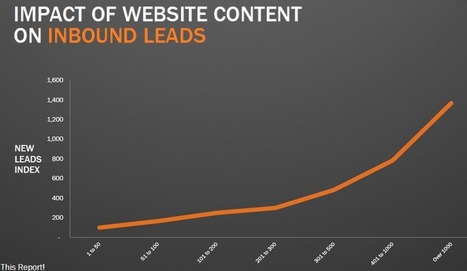


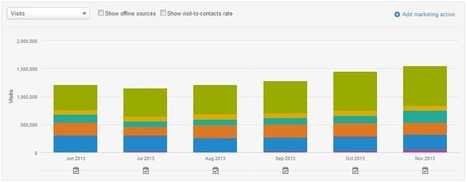
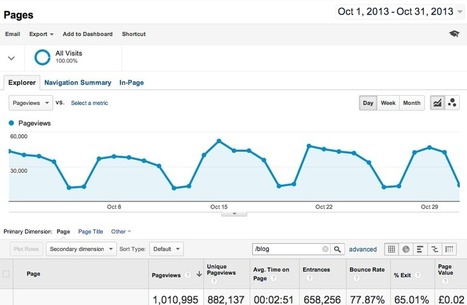



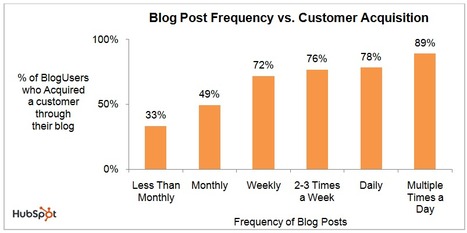



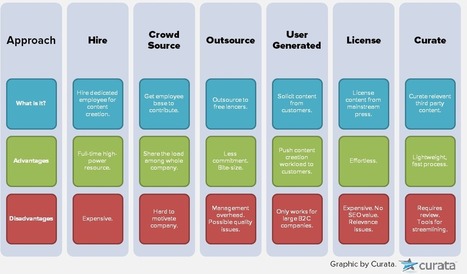



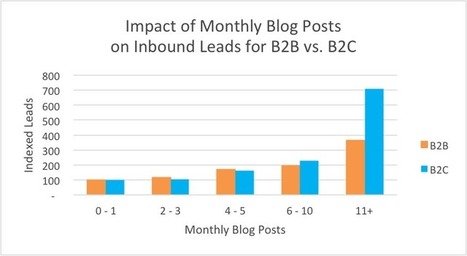
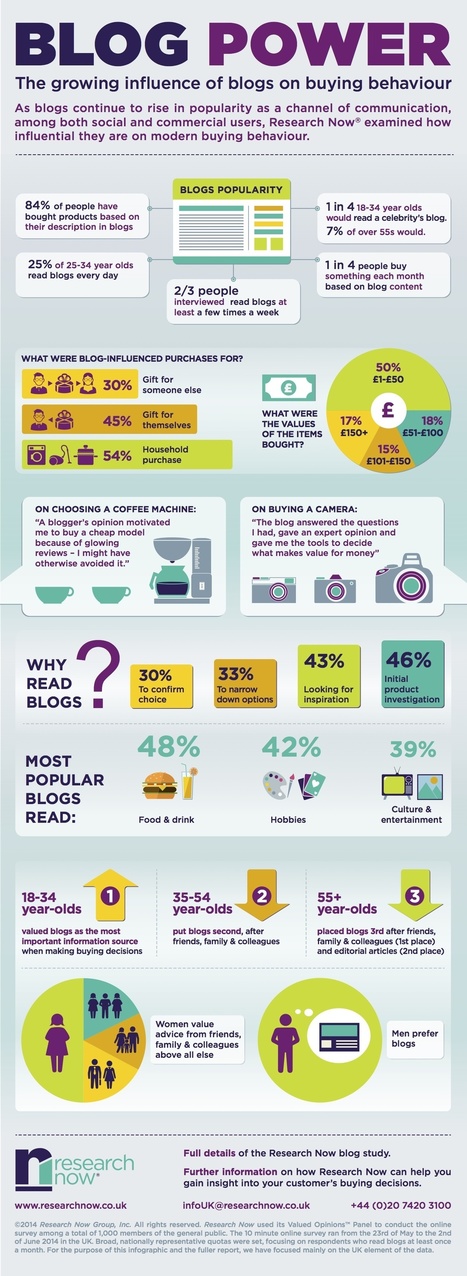




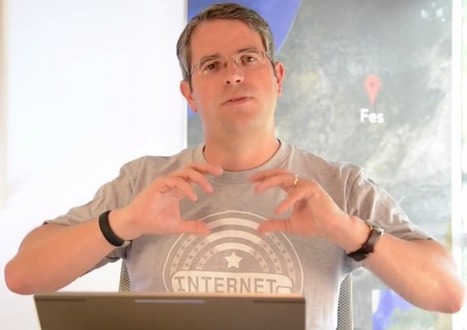


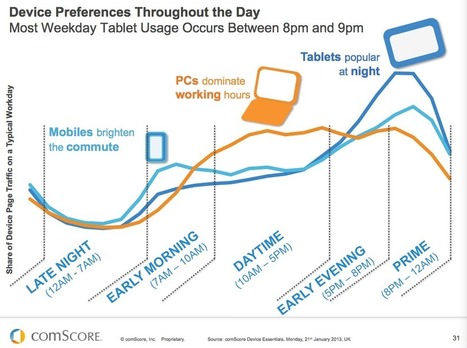




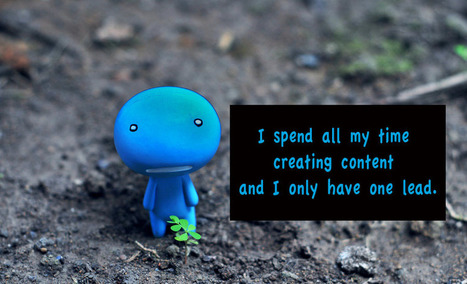




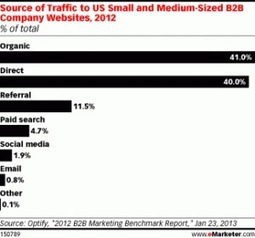






Look at the findings from Orbit Media's blogger survey, and get tips to take full advantage of this still-powerful channel....